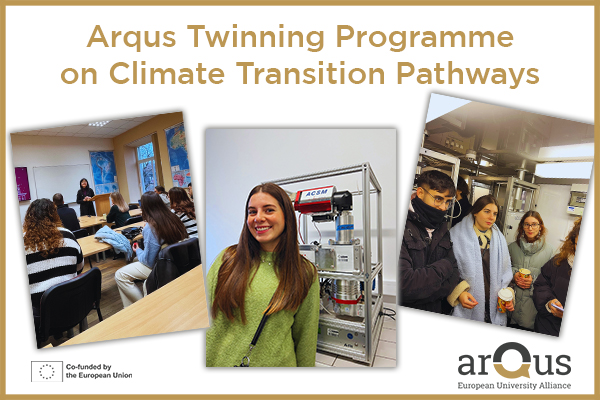Students from the University of Granada Visit Vilnius University in the Second Phase of the Arqus Twinning Programme on Climate Transition Pathways
 From 9 to 13 December 2024, a group of students from the University of Granada (UGR) visited Vilnius University as part of the second phase of the Twinning 2.0 activity on Climate Transition Pathways.
From 9 to 13 December 2024, a group of students from the University of Granada (UGR) visited Vilnius University as part of the second phase of the Twinning 2.0 activity on Climate Transition Pathways.
The main purpose of the Twinning 2.0 initiative is to strengthen subject-related collaboration between university staff and students on issues of global relevance, in this case, on sustainability and climate change. In this second phase, the UGR participants, together with the Coordinator of the Twinning 2.0 programme in Granada, Juan Luis Guerrero Rascado, professor at the Department of Applied Physics of the UGR, had the opportunity to explore northern European approaches to the climate transition. This experience complemented the first part of the programme, in which Vilnius students learned about the Mediterranean perspective on this challenge during their visit to the University of Granada.
The week began with a warm welcome at Vilnius University, where participants had the opportunity to visit the Meteorological Station of the Institute of Geosciences. There, they analysed atmospheric phenomena and discussed current issues such as light and noise pollution. In addition, they participated in a very enriching collaborative seminar together with other students and professors from Vilnius University.
On the second day, the delegation visited the Centre for Physical Sciences and Technology, where they explored advanced technologies for measuring aerosol particles and analysing microplastics, and reflected on the environmental challenges that modern societies face. Later, they met ID Vilnius, an organisation leading sustainable urban planning and smart city development projects.
The third day was marked by the visit to the Lithuanian Hydrometeorological Service, where students learned about the use of radar technologies and innovative weather forecasting techniques, key tools for climate risk management. On the fourth day, participants visited the Lithuanian Environmental Protection Agency, where they were immersed in air quality monitoring and modelling methods. This meeting highlighted the importance of these practices to promote sustainability in urban environments.
The experience culminated on the fifth day with a cultural tour of Vilnius, which allowed the delegation to discover the historical and heritage richness of the Lithuanian capital, consolidating the links created during this intense week of exchange.
The Twinning programme on Climate Transition Pathways reaffirms the importance of international cooperation to address the challenges of climate change and highlights the importance of combining science, technology and culture to foster this collaboration on sustainability and smart urbanism.
Under the coordination of Professor Juan Luis Guerrero Rascado, this experience has been a successful example of interdisciplinary and multinational collaboration, which has consolidated the role of the Arqus Alliance as the driving force for solutions to global climate challenges.